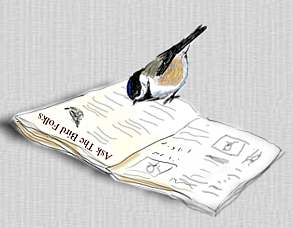
Dear Bird Folks,
I went out to dinner the other night and, for some reason that I still don’t understand, some guy came over to our table and started yapping about chickadees. In the course of the conversation the guy claimed that in the colder weather, chickadees’ brains actually grow larger. Being too surprised to say anything we just sat, listened and didn’t question anything the guy was telling us. Now I’m asking you. Are birds’ brains actually able to grow larger during the winter or was this guy simply too filled with holiday spirits?
-Wendy, N. Truro MA.
Let me guess Wendy,
The restaurant that you ate in was the very delicious “Napi’s,” in nearby Provincetown. Am I right? (Even if I’m not right just play along, because it is important to the framework of this answer. Or something like that.) I would also guess that the name of the guy who came over to your table to chew your ear off, was Napi, who by some amazing coincidence is the owner of Napi’s. How do I know? Because I’ve been there and have also heard the same story about the big brained chickadees. And I too just sat and politely listened, but inside I was laughing pretty hard.
The reason why the Black-capped Chickadee is on the top ten of everybody’s bird list is because they never leave us. If you have chickadees in your yard in July, you are probably going to have them in January too. Chickadees are way too cool to be frightened off by something as minor as several months of dark, stormy and bone-chilling weather. The long winter might be too much for many of the sissy birds, but not chickadees. There is no massive exodus to the land of oranges for them. They face winter head on. In order to do that, they have developed a pretty impressive array of survival skills. And one of those skills may indeed be growing a bigger head.
A few weeks back we mentioned that squirrels bury food throughout the fall so they will have enough available to survive the winter. Chickadees also hide food in the fall, only they don’t bury it in the ground, they stash their food in cracks and crevices of trees. When a squirrel wants to retrieve a meal, it sniffs the ground until it smells something yummy and digs it up. Chickadees on the other hand aren’t able to find food by smell, because they don’t have a nose, or at least one that is any good. They must remember where they hid their food and that’s not as easy as it sounds.
A chickadee’s winter territory may be as large as twenty acres, which includes thousands of trees and countless hiding places for seeds and other bits of food. Yet, the little bird is able to remember exactly where each seed is hidden. And here is the part that I find amazing. Once the food is recovered, the chickadee doesn’t return to look for more food. It is somehow able to keep track of which stash has been cleaned out and doesn’t bother looking there again. You might not be impressed with that but the next time you lose your car keys, count how many times you look in the same place over and over. A chickadee never does that when it’s looking for its car keys. Animals have a fixed number of brains cells and the best that we can hope for is not to lose the ones we have. Unfortunately the aging process causes the loss of those precious brain cells and to prove that, researchers point to high numbers of people who still watch infomercials.
Growing new brain cells was always thought to be impossible; well impossible until someone decided to ask the chickadees. Recent studies have suggested that part of the chickadee’s brain, the area that it uses to find stashed food, actually grows larger during the colder months. Once the warmer weather returns and they no longer have to locate hidden food, their brain shrinks back to its normal size. There is no sense in carrying around a larger brain, if it’s not going to be used. Just ask Paris Hilton.
As much as I hate to admit it Wendy, ol’ Napi was right on this one. Apparently the chickadees do experience some seasonal brain growth. On the surface, this story might seem like yet another reason why chickadees are the best birds ever, but there is more to it than that. If we can understand the dynamics of the chickadees’ brain growth, perhaps we can apply it to humans. Someday we might be able to better repair the damage caused by stroke or Alzheimer’s. But right now I’d just settle for being able to finding where I put my car keys.